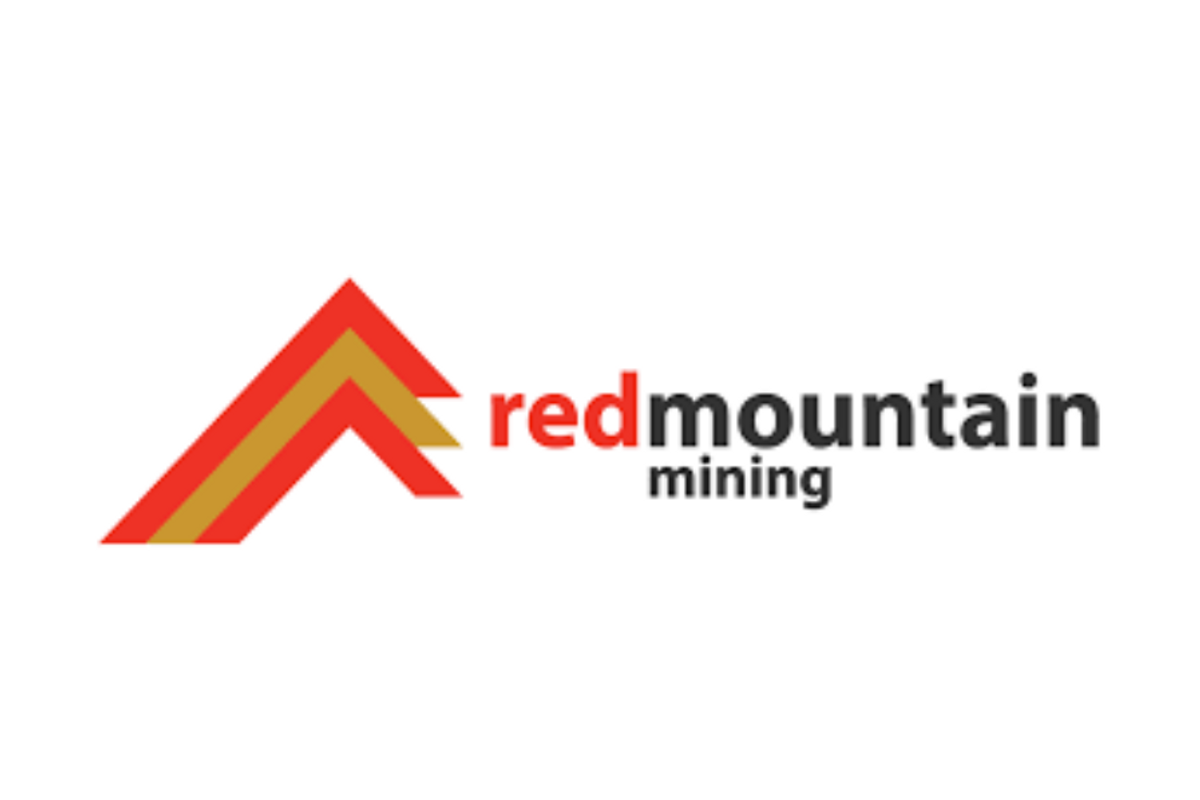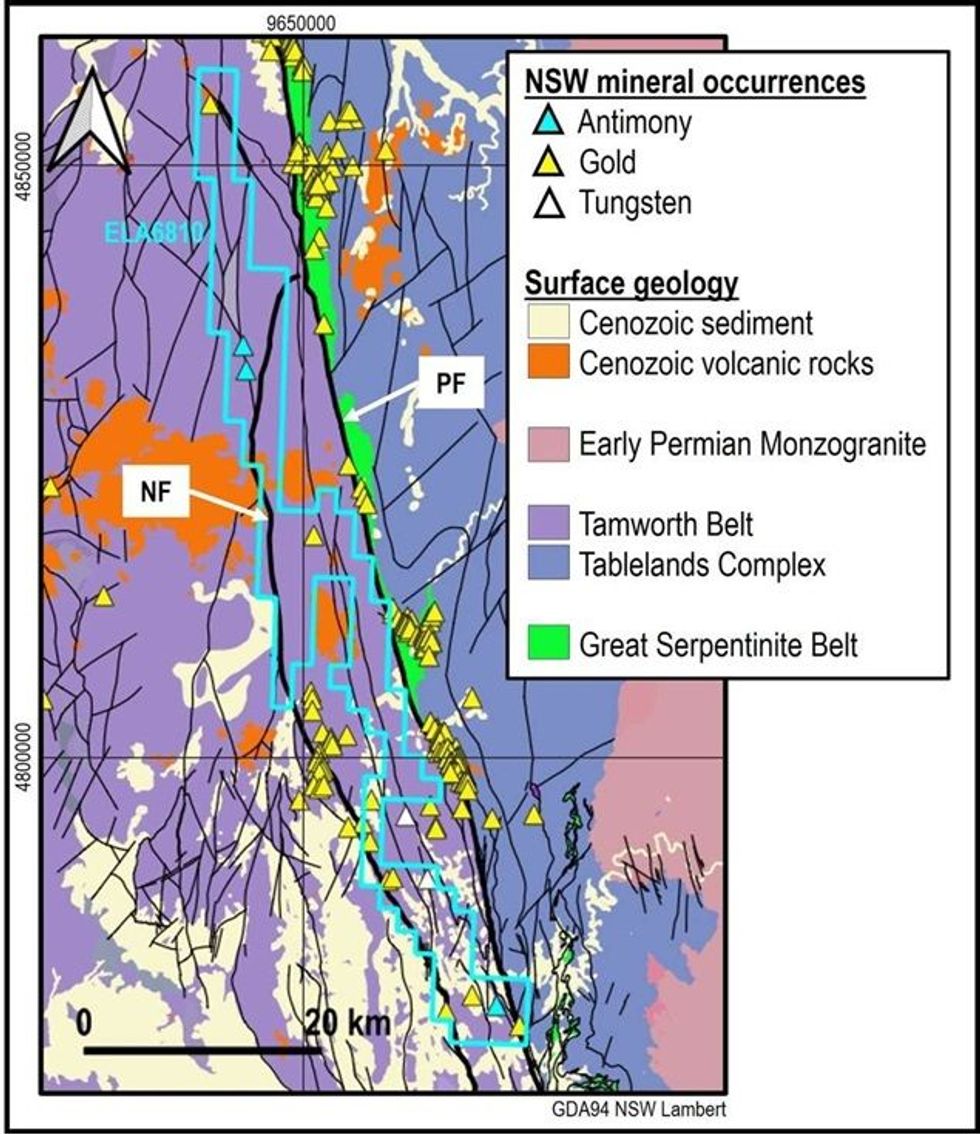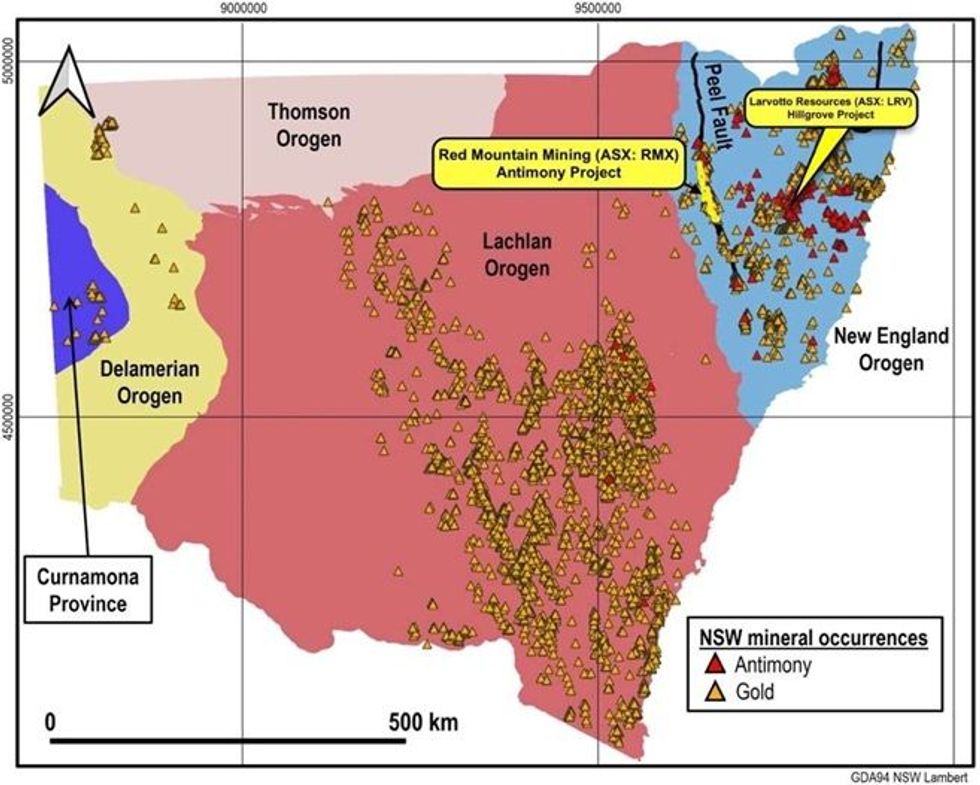
November 28, 2024
Red Mountain Mining Limited (“RMX” or the “Company”) is pleased to announce the receipt of a Notice of Proposed Grant of Exploration Licence (relating to ELA6810) from the NSW Department of Primary Industries. The project encompasses 391km2 of prospective ground within the Southern New England Orogen (SNEO) in northeastern New South Wales. The SNEO is recognised as Australia’s premier Antimony province (Figure 1). Antimony occurs in hydrothermal quartz veins, breccias and stockworks, often with associated gold and/or tungsten mineralisation.
HIGHLIGHTS
- Exploration Licence to be granted for a period of six years and covering a significant package of 391 km2 of prospective ground within the Southern New England Orogen of NSW, Australia’s premier Antimony Province
- The tenement extends over an 85km strike extent of the Peel Fault System, a known mineralised structural corridor, and includes multiple known Antimony and Gold mineral occurrences
- The best reported historical results to date include 465ppm Sb and 0.224ppm Au
- Given limited previous exploration these historical sampling results represent a significant greenfield discovery opportunity for Antimony and Gold
- Antimony prices have surged to ~US$33,500 per metric ton* as of 21 November following China’s recent export ban on a wide range of Antimony products
Figure 1: Known NSW Gold and Antimony mineral occurrences relative to basement orogenic units. The map clearly demonstrates the prospectivity of the New England Orogen for Antimony and Gold. The location of the Hillgrove Deposit, Peel Fault and ELA6810 are also shown.*Argus Media, Sb ingot min 99.65% fob China 21/11/2024 (https://www.argusmedia.com/metals-platform/metal/minor-and-specialty-metals-antimony).
The Hillgrove project (ASX: LRV) is approximately 20km east of Armidale, is Australia’s largest known Antimony deposit. The mine has recorded production of over 730,000 oz of gold and over 50,000 tonnes of Antimony and a remaining resource of 1.7Moz Au equivalent at a grade of 7.4g/t Au equivalent, including 90,000 tonnes of Antimony, with significant exploration upside1.
Project Geology
The project lies approximately 100km west of Hillgrove and extends for 85km immediately west of the Peel Fault. The geology of the tenement is dominated by isoclinally folded Carboniferous metasediments of the Tamworth Belt (Figure 2), which is a forearc basinal package related to west-dipping subduction of oceanic crust beneath the Lachlan Orogen. Ultramafic melanges of the Great Serpentinite Belt, which outcrop along the Peel Fault, are considered to be remnants of this oceanic crust. The Peel Fault System has recognised world-class mineral potential, with over 400 known orogenic gold and base metal mineral occurrences along its over 400km strike extent, but is underexplored with less than 200 mostly shallow drillholes over its length, the majority of which are focused on discrete prospects.

Tamworth Belt metasediments within the project are cut by multiple splays off the Peel Fault, including the major Namoi Fault (Figure 2). Gold, Antimony and Tungsten mineralisation are associated with orogenic quartz-vein and stockwork systems hosted within the Peel Fault System. The tenement encompasses nine historical gold workings (a mixture of primary orogenic vein-style and deep alluvial workings); three vein- hosted Antimony occurrences with historical workings; and one vein-hosted tungsten occurrence.
Click here for the full ASX Release
This article includes content from Red Mountain Mining, licensed for the purpose of publishing on Investing News Australia. This article does not constitute financial product advice. It is your responsibility to perform proper due diligence before acting upon any information provided here. Please refer to our full disclaimer here.
The Conversation (0)
06 February
Editor's Picks: Is Gold and Silver's Price Correction Over?
It's been a wild couple of weeks for gold and silver. After surging to record highs at the end of January, prices for both precious metals saw significant corrections, creating turmoil for market participants.This week brought some relief, with gold bouncing back from its low point and even... Keep Reading...
06 February
Blackrock Silver to Present at the Precious Metals and Critical Minerals Virtual Investor Conference on February 10th 2026
Blackrock Silver Corp. (TSXV: BRC,OTC:BKRRF) (OTCQX: BKRRF) (FSE: AHZ0) ("Blackrock" or the "Company") is pleased to announce that Andrew Pollard, President & Chief Executive Officer of the Company, will present live at the Precious Metals & Critical Minerals Virtual Investor Conference hosted... Keep Reading...
05 February
Experts: Gold's Fundamentals Intact, Price Could Hit US$7,000 in 2026
Gold took center stage at this year's Vancouver Resource Investment Conference (VRIC), coming to the fore in a slew of discussions as the price surged past US$5,000 per ounce. Held from January 25 to 26, the conference brought together diverse experts, with a focus point being the "Gold... Keep Reading...
05 February
Barrick Advances North American Gold Spinoff After Record 2025 Results
Barrick Mining (TSX:ABX,NYSE:B) said it will move ahead with plans to spin off its North American gold assets after a strong finish to 2025.The Toronto-based miner said its board has authorized preparations for an IPO of a new entity that would house its premier North American gold operations,... Keep Reading...
05 February
Peruvian Metals Secures 6 Year Agreement with Community at Mercedes Project
Peruvian Metals Corp. (TSXV: PER,OTC:DUVNF) (OTC Pink: DUVNF) ("Peruvian Metals or the "Company") is pleased to announce that the agreement between San Maurizo Mines Ltd. ("San Maurizo"), a private Manitoba company which holds a 100% direct interest in the Mercedes Property, and Comunidades... Keep Reading...
05 February
TomaGold Borehole EM Survey Confirms Berrigan Deep Zone
Survey also validates significant mineralization and unlocks new targets Highlights Direct correlation with mineralization : The modeled geophysical plates explain the presence of semi-massive to massive sulfides intersected in holes TOM-25-009 to TOM-25-015. Priority target BER-14C :... Keep Reading...
Latest News
Interactive Chart
Latest Press Releases
Equity Metals Exhibiting at the 2026 PDAC
06 February
Related News
TOP STOCKS
American Battery4.030.24
Aion Therapeutic0.10-0.01
Cybin Corp2.140.00






